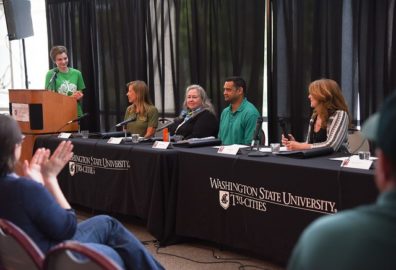Promoting sustainability on and off campus
Elinor Lake and her family have always been environmentally conscious. From ensuring their appliances were energy efficient to turning off the lights when they left a room, she and her family knew that even small actions could make an impact.
When Lake became a student at WSU Tri-Cities, pursuing undergraduate degrees in biology and humanities, she took her efforts to the next level, hoping to promote a culture of sustainability through campus initiatives and community projects.
Lake’s efforts began after meeting with executives of CH2M, an international engineering firm that provided funds for research she conducted through the WSU Tri-Cities Chancellor’s Summer Scholars program. In her project, she studied professional women in academia and highlighted the traits, qualities, and academic contributions that made them successful.

In talking with CH2M officials, Lake learned the company operates “an impressive sustainability program,” she said. “All of their events are zero-waste. They made a corporate commitment to be as environmentally friendly as they could.”
From that initial discussion, CH2M contacted University officials, offering the company’s support for Lake’s campus and community-focused sustainability efforts.
Creating new opportunities
Backed by WSU administrators and community organizations, and under the mentorship of Environmental Club advisor Gretchen Graber, Lake and her fellow environmental club members created a number of opportunities for the campus and regional community to get involved in sustainability.
With corporate and University administrative support, “everything really started to come together,” Lake said.
Last school year, the club organized two cleanup days at Bateman Island in Richland in partnership with the city, the Tapteal Greenway Association, and several other organizations. The two events attracted more than 120 volunteers who collected some 50 large bags of trash—half of which was recycled.

“The Bateman Island events were actually far more successful than I had anticipated,” Lake said. “It was inspiring and encouraging to see just how many people, both from WSU Tri-Cities and the general Tri-Cities community, were interested in cleaning up one of our local recreation areas.”
The club also organized its first Earth Day celebration and hosted speakers from across the mid-Columbia region. Food was served using sustainable materials and the club provided information about what people can do in their own homes and in the community to reduce, reuse, and recycle.
“It’s a great way to publicize not only how people can start recycling more on campus but also how they can take matters into their own home,” she said.
Lake praised Graber for providing the knowledge, community connections, and experience to make the group’s efforts successful.
“Working with Gretchen Graber in the club over the past year and a half has undoubtedly been one of the greatest learning experiences of my time at WSU Tri-Cities,” she said. “Gretchen contributed tremendous efforts toward the club and was invaluable with regard to my growth as a leader and as an aspiring change agent. She connected the club with key community partners. She deserves so much credit.”
Partnering with the campus community
Lake recently turned her attention toward working with the campus maintenance and facility teams to publicize recycling and other sustainable practices on campus, with the hope of adding to the positive momentum of University efforts to reduce waste.

Several additional recycling containers are now available on campus, and individuals are encouraged to keep paper recycling bins in their offices.
The facilities and operations team also switched to environmentally-friendly cleaning products, which reduces the amount of contaminants that are released into the environment.
“We have cut down the amount of waste and trash sent to the landfill by 50 percent in the last four years,” said Carrie Ann Andersen, assistant director of campus facilities and operations. Trash pickup was reduced from three to two times a week, she said.
Anderson credits Lake for making a difference by spreading word about their efforts and educating individuals about how they, too, can take sustainability into their own hands.
“With Elinor, her biggest help is that she is out there, she is talking to people, she is educating them,” Andersen said. “We’re creating a culture of recycling and a culture of sustainability. It’s not only helping the planet. It is good business. Everyone wins.”